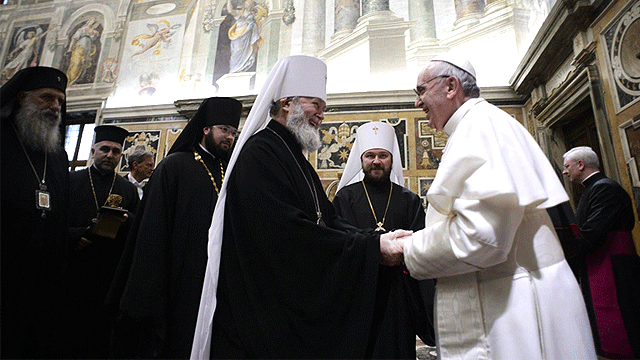SEARCH

By Patricia Zapor Catholic News Service November 10, 2014 BALTIMORE (CNS) -- Four of the daily homilies of Pope Francis over the 19 months of his pontificate in particular help explain the direction he has taken in ecumenism and interreligious efforts, said a priest who has served as a Vatican spokesman during events including the recent extraordinary Synod of Bishops. Basilian Father Thomas Rosica, a U.S. priest who also is CEO of Salt and Light Television, Canada's national Catholic network, said in a Nov. 9 workshop for bishops before their annual fall general assembly that Pope Francis' daily Mass homilies and his 2013 apostolic exhortation, "Evangelii Gaudium" ("The Joy of the Gospel"), give context to his approach. In Argentina, then-Cardinal Jorge Bergoglio had a rabbi among his close friends and friendships with evangelicals and Pentecostals, who have participated in events at the Vatican since he became pope. As pope, he has also reached out to other Christians, Jews and Orthodox in ways that have captivated many non-Catholics, who pore over the details of Francis' writings and relish activities such as his Holy Thursday visit to an Italian prison to wash the feet of inmates of diverse faiths, said Father Rosica. He said he mentioned to Pope Francis recently that people the world over are reading "Evangelii Gaudium," as Father Rosica has discovered from the many invitations he receives to speak on the topic. "I said to the pope, 'Do you realize what you're doing?' The pope replied, 'I think so.'" "Building bridges is the work of ecumenism, of evangelization," said Father Rosica. "It's the work of going out to the whole world to proclaim the good news of our salvation in Jesus Christ. Building walls is what fearful, insecure people do to protect what they have and keep others out. "Pope Francis wants to build bridges that everyone can cross," he said, especially the poor, those who have been marginalized and social outcasts. "In 'Evangelii Gaudium' Pope Francis invites -- and challenges -- all of us to move beyond our 'comfort zones,'" Father Rosica said. "He wants us to be warm, welcoming and forgiving. He wants us to eat with tax collectors and sinners; he wants us to forgive the woman caught in adultery (while admonishing her to sin no more); he wants us to welcome and respect foreigners (even our enemies), and, above all, not to judge others." There's nothing new in any of that, said the priest. "It is only the Gospel message. It's been our mission, our mandate and our story for over 2,000 years."

The four homilies Father Rosica cited date from one a month after his election as pope to as recently as Nov. 4. In the first, he discussed the "courageous attitude of St. Paul in Areopagus, when, in speaking to the Athenian crowd, the Apostle to the Gentiles sought to build bridges to proclaim the Gospel." The pope said an attitude such as Paul's that seeks dialogue is "closer to the heart" of the listener and why Paul was a builder of bridges, not of walls. Last October, Father Rosica said, Pope Francis warned Christians against behaving as though "the key is in their pocket and the door is closed." He talked about Christians who have the key to the church in their hand but "take it away without opening the door." People who may wish to enter find themselves on the street in front of a closed church, with excuses and justifications given for why they cannot enter, the pope said. "Worse still," said Father Rosica, citing the pope, they keep the door closed, don't allow anyone to enter and in doing so, keep on the outside themselves. "When this Christian is a priest, a bishop or a pope it is worse," said Francis. The situation arises when "the faith passes, so to speak through a distiller and becomes ideology. And ideology does not beckon people." "When a Christian becomes a disciple of the ideology, he has lost the faith, he is no longer a disciple of Jesus, he is a disciple of this attitude of thought." Father Rosica said the pope went on to say that when faith becomes ideology, it chases away people and distances the church from the people. Father Rosica also quoted from an October homily this year, in which the pope spoke about unity in diversity. He used the image of a church made of living stones, as opposed to weak bricks. "Humility, gentleness, magnanimity: These are weak things, because the humble person appears good for nothing; gentleness, meekness appear useless; generosity, being open to all, having a big heart," Father Rosica quoted. "And then he says more: Bearing with one another through love. Bearing with one another through love, having what at heart? Preserving unity. The weaker we are with these virtues of humility, generosity, gentleness, meekness, the stronger we become as stones in this temple." The fourth key homily, according to Father Rosica, was the pope's Nov. 4 teaching on the parable of the man who gave a banquet to which he invited many, but some declined. As Pope Francis noted, Father Rosica said, "In the end the invited guests prefer their own interests rather than sharing dinner together: They do not know what it means to celebrate." He said that form of self-interest makes it difficult to listen to the voice of God, "when you believe that that the whole world revolves around you: there is no horizon, because you become your own horizon. And there is more behind all of this, something far deeper: fear of gratuity. We are afraid of God's gratuity. He is so great that we fear him."